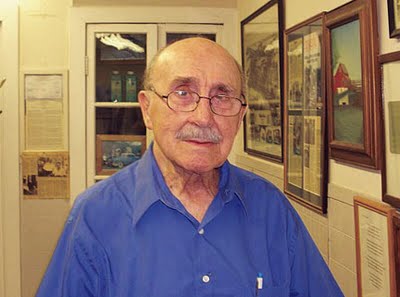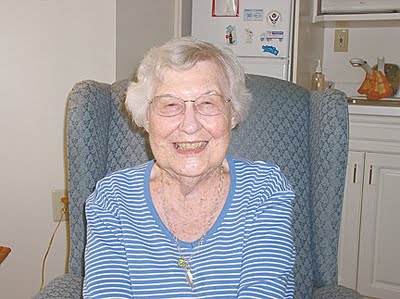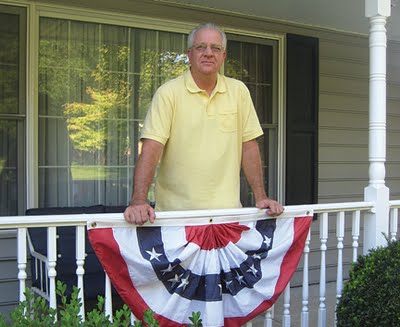Joseph Cuttone
Bristolian finds new calling after Naval discharge.
By Tim Chicirda, BucksLocalNews.com

One of the most impressive things about many of the veterans profiled on this page over the past years is the fact that many of them did not let their military career define them.
These noble defenders of freedom eventually all come back to being a regular "civilian" sooner or later. And, making that transition from the battlefields to the business and/or working world should truly be applauded.
Soldiers need to adapt back to normal life and no one has done so with more success than Bristol Borough's own, Joseph Cuttone.
Cuttone's military career was very short. In fact, in the early part of the second world war, Cuttone was a turret lathe operator, which is a form of metalworking lathe that is used for repetitive production of duplicate parts, at the Hunter Manufacturing Company.
There, he also performed the duties of staff photographer for their newsletter, the “Hunter Projectile.”
Joseph was drafted in 1943 to the Navy Seabees, the Construction Battalions of the US Navy, and was sent to Williamsburg, VA.
This is where his military career outlook became very bleak. As Cuttone entered the service, he no sooner entered then he had to leave.
Joseph received a medical discharge from the Navy because his “eyes were not good enough” and it prohibited him from performing some of the required duties.
While the armed forces were sad to see him go, the Bristol Borough community were thrilled to welcome a future local staple into town.
The 92-year-old Cuttone remembers his early days in Bristol, a town that barely resembles the modern version that we are all accustomed to seeing today.
“When I was a kid, Bristol was not what it is today, there was lots of open land," said Cuttone. "I was raised on goat’s milk and most of the food that we ate was raised in our yard.”
Joe’s dad, Andrew, was a farmer and his mother, Francesca, worked at the [Keystone] Steel’s Woolen Mill. Cuttone helped his parents, by kneading the bread and collected eggs from the hen house and picking the best good green grass for the goats so the milk was richer.
“When my dad said something, I listened.”
Right around the time Cuttone's life was uncertain with his military, something great happened: Joe met his wife, Catherine R. Vitale, at a picnic in New Jersey. Their first date was sharing a sundae in an ice cream parlor in Camden.
Catherine died just last year, only a month before her and Joseph's 66th wedding anniversary.
So after marriage, Cuttone attempted to enter the political world. Joseph ran for public office as Fourth Ward councilman, five times. He also for the School board and as tax collector. His cousin, Anna Bono Larrisey, is the current Borough tax collector. Anna’s grandfather and Joe’s grandmother were brother and sister.
But, Cuttone's true calling was yet to come.
Joseph now runs an old-fashioned barbershop.
Barber Cuttone learned his trade in Brownie’s Barber School in Trenton. He cut Senator Joseph Ridgway Grundy’s hair there, in fact. This has now been his career for over three quarters of a century.
Joseph has been barbering for almost 75 years and continues to do what he loves.
So much for that eye problem, as Cuttone has continually performed a great service to many generations of Bristolians.
Cuttone also gave much of his time back to the community in other ways.
"Joe was on the committee of the Columbus 500 organization and we did several projects together," said local sculptor Joe Pavone. "We produced an Italian Immigration documentary film and Joe played a very important part, very verbal and such a keen memory. He is really a Bristol Borough character."
***
Cate Murway contributed to this piece.
By Tim Chicirda, BucksLocalNews.com
One of the most impressive things about many of the veterans profiled on this page over the past years is the fact that many of them did not let their military career define them.
These noble defenders of freedom eventually all come back to being a regular "civilian" sooner or later. And, making that transition from the battlefields to the business and/or working world should truly be applauded.
Soldiers need to adapt back to normal life and no one has done so with more success than Bristol Borough's own, Joseph Cuttone.
Cuttone's military career was very short. In fact, in the early part of the second world war, Cuttone was a turret lathe operator, which is a form of metalworking lathe that is used for repetitive production of duplicate parts, at the Hunter Manufacturing Company.
There, he also performed the duties of staff photographer for their newsletter, the “Hunter Projectile.”
Joseph was drafted in 1943 to the Navy Seabees, the Construction Battalions of the US Navy, and was sent to Williamsburg, VA.
This is where his military career outlook became very bleak. As Cuttone entered the service, he no sooner entered then he had to leave.
Joseph received a medical discharge from the Navy because his “eyes were not good enough” and it prohibited him from performing some of the required duties.
While the armed forces were sad to see him go, the Bristol Borough community were thrilled to welcome a future local staple into town.
The 92-year-old Cuttone remembers his early days in Bristol, a town that barely resembles the modern version that we are all accustomed to seeing today.
“When I was a kid, Bristol was not what it is today, there was lots of open land," said Cuttone. "I was raised on goat’s milk and most of the food that we ate was raised in our yard.”
Joe’s dad, Andrew, was a farmer and his mother, Francesca, worked at the [Keystone] Steel’s Woolen Mill. Cuttone helped his parents, by kneading the bread and collected eggs from the hen house and picking the best good green grass for the goats so the milk was richer.
“When my dad said something, I listened.”
Right around the time Cuttone's life was uncertain with his military, something great happened: Joe met his wife, Catherine R. Vitale, at a picnic in New Jersey. Their first date was sharing a sundae in an ice cream parlor in Camden.
Catherine died just last year, only a month before her and Joseph's 66th wedding anniversary.
So after marriage, Cuttone attempted to enter the political world. Joseph ran for public office as Fourth Ward councilman, five times. He also for the School board and as tax collector. His cousin, Anna Bono Larrisey, is the current Borough tax collector. Anna’s grandfather and Joe’s grandmother were brother and sister.
But, Cuttone's true calling was yet to come.
Joseph now runs an old-fashioned barbershop.
Barber Cuttone learned his trade in Brownie’s Barber School in Trenton. He cut Senator Joseph Ridgway Grundy’s hair there, in fact. This has now been his career for over three quarters of a century.
Joseph has been barbering for almost 75 years and continues to do what he loves.
So much for that eye problem, as Cuttone has continually performed a great service to many generations of Bristolians.
Cuttone also gave much of his time back to the community in other ways.
"Joe was on the committee of the Columbus 500 organization and we did several projects together," said local sculptor Joe Pavone. "We produced an Italian Immigration documentary film and Joe played a very important part, very verbal and such a keen memory. He is really a Bristol Borough character."
***
Cate Murway contributed to this piece.
 RSS Feeds
RSS Feeds





